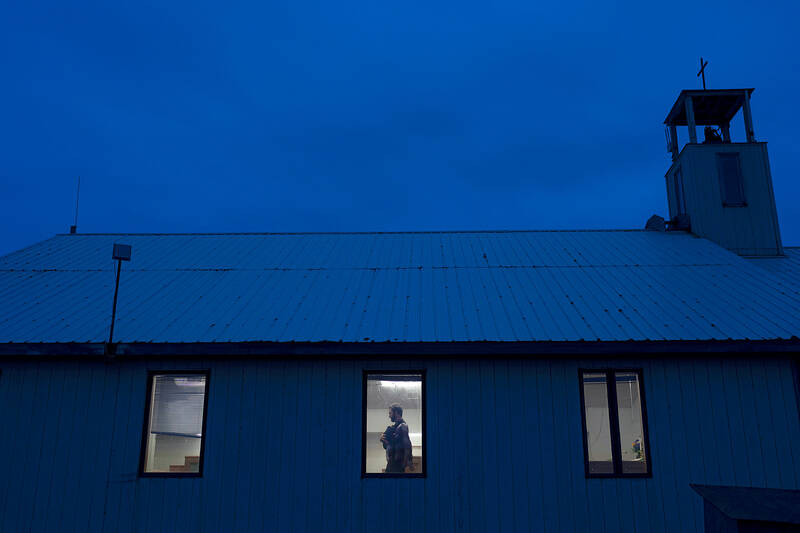After his business failed, its owner became irritable, anxious and was having trouble sleeping. He was prescribed sleeping pills — and for the next 10 years, it was the only way he could get any sleep. As he became increasingly addicted, the side effects of memory impairment and brain fog worsened.
The man was eventually diagnosed with anxiety and depression due to long-term work stress. Through treating his mental health issues, he was able to get off the pills, according to a Liberty Times (Taipei Times’ sister paper) report.
Too often in Taiwan sleeping pills are prescribed as a convenient cure-all for insomnia, when the problems are actually caused by other medical issues.

Photo: AP
Lee Hsin-chien (李信謙), director of Taipei Medical University’s Sleep Clinic, tells the Taipei Times that only about 15 percent of the 4.41 million people (about one-fifth of the population) who consumed 10.5 billion sleeping pills last year actually suffered from primary insomnia. This data only includes those who acquired pills through the National Health Insurance (NHI), and Lee says the actual figures are higher. By comparison, about 8 percent of adults in the US used sleeping pills last year.
Sometimes the cause is something as simple as lack of exercise or bad sleeping habits, but Lee says that sleeping pills remain the go-to method of treatment. Due to the relative ease to get a prescription, long-term dependency is increasing every year. The aging population and COVID-19 stress also contributed to the recent surge.
Besides the adverse effects of the pills, insomnia can be an indication of life-threatening issues such as heart disease and dementia, and reliance on sleeping medication often delays treatment, Lee says.

Photo: EPA-EFE
“In the past, we saw insomnia as a symptom, so we just prescribed people pills,” he says. “But that’s just a temporary solution. You can give a patient fever medication, but you still need to find the underlying cause. Is it a cold? Is it COVID-19? Is it pneumonia?”
The key, Lee says, is to educate both physicians and patients to be more diligent in determining the true cause of insomnia, and to promote awareness of non-drug treatments. But change has been slow, as doctors usually don’t have much time to spend with one patient, plus services such as sleep tests and cognitive behavioral therapy for insomnia (CBTI) require effort and patience, and are not covered by the health care system.
CARELESS PRESCRIPTIONS
According to a 2020 National Health Research Institutes report on inappropriate use of sleeping pills, the main challenges include people sharing prescriptions, acquiring pills from family and friends as well as seeing multiple doctors to amass medication.
The pills are too often carelessly prescribed. For example, Lee says that a patient might says that they are having problems sleeping when they re-fill a prescription for high blood pressure, and the doctor prescribes sleeping pills. Many health care professionals don’t take into account the official definition of chronic insomnia, which entails having trouble sleeping at least three nights a week over a period of three months. Moreover, insomnia is often attributed to other causes such as sleep apnea, respiratory issues, substance use, mental illness or underlying diseases.
It’s generally acceptable for someone with primary insomnia to use pills regularly for about a year or two, Lee says, but too many have been using for more than five to 10 years in increasing doses.
As insomnia can be caused by a multitude of issues, it often requires holistic, cross-specialty examination and treatment, which is lacking in Taiwan. At most, doctors will provide warnings about dependency and side effects, the report states, but the patients often fail to follow the instructions.
Doctors should refrain from handing out long-term prescriptions, and must devise a plan with the patients to gradually reduce usage, National Taiwan University Hospital Center of Sleep Disorder head Chen Hsi-chung (陳錫中) states in the report.
Chen adds that doctors must insist that patients medicate as a last resort — if they have an important meeting the next day and they’ve already tried to sleep for 30 minutes.
The report says that sleeping pills can cause memory impairment, dizziness, daytime drowsiness, heightened risk of motor vehicle accidents and, in older people, a greater risk of falling as well as developing dementia.
SYSTEMIC ISSUES
While the NHI has issued a notice to medical associations reminding them to tighten management of prescriptions, and has a watch list for those who overuse certain medications, employing tough restrictions is not the solution, Lee says.
In some countries, only psychiatrists can prescribe sleeping pills, or the patient has to undergo a psychiatric evaluation first. But in Taiwan, only about 20 percent of the prescriptions come from psychiatry clinics.
Lee says this is hard to change in Taiwan due to the stigma toward seeking mental health treatment. He suggests a more moderate approach such as mandating psychiatric evaluation if someone has been continuously prescribed sleeping pills for a certain period of time.
Public education is crucial. Lee points to a recent University of Florida study showing that the US saw a 31 percent decrease in the use of common sleep medications between 2013 and 2018. The trend is “thought to be linked to a greater awareness of the potential pitfalls posed by these prescriptions.”
“Every time the NHI releases the figures for sleeping pill use and the media reports on it, general usage dips,” Lee says. “But it’s not enough, as the overall numbers still climb each year.”
The Taiwan Sleep Medicine Society, of which Lee is a director, has been urging physicians to make the correct diagnoses before handing out pills, and also to consider non-drug treatments.
The report provides an extended list of options: herbal cures, traditional Chinese medicine, acupuncture, relaxation methods, behavioral and neurofeedback therapy and so on. Some are simple changes in routine, such as refraining from napping during the day, increased exercise, diet changes and changing the bedroom lighting.
However, CBTI is the only comprehensive treatment that is scientifically proven and the report strongly suggests that it be covered by the NHI.
Ultimately, there needs to be a structural overhaul of the current medical system where doctors are not trying to see as many patients as possible. The assumption that one must be given a bunch of pills to be cured still persists, and there’s little motivation for an overworked doctor to examine the root cause when patients are demanding medication.
“[Reaching a proper diagnosis] simply takes that much more effort for both doctors and patients than just swallowing pills,” the report states.

On April 26, The Lancet published a letter from two doctors at Taichung-based China Medical University Hospital (CMUH) warning that “Taiwan’s Health Care System is on the Brink of Collapse.” The authors said that “Years of policy inaction and mismanagement of resources have led to the National Health Insurance system operating under unsustainable conditions.” The pushback was immediate. Errors in the paper were quickly identified and publicized, to discredit the authors (the hospital apologized). CNA reported that CMUH said the letter described Taiwan in 2021 as having 62 nurses per 10,000 people, when the correct number was 78 nurses per 10,000

As we live longer, our risk of cognitive impairment is increasing. How can we delay the onset of symptoms? Do we have to give up every indulgence or can small changes make a difference? We asked neurologists for tips on how to keep our brains healthy for life. TAKE CARE OF YOUR HEALTH “All of the sensible things that apply to bodily health apply to brain health,” says Suzanne O’Sullivan, a consultant in neurology at the National Hospital for Neurology and Neurosurgery in London, and the author of The Age of Diagnosis. “When you’re 20, you can get away with absolute

May 5 to May 11 What started out as friction between Taiwanese students at Taichung First High School and a Japanese head cook escalated dramatically over the first two weeks of May 1927. It began on April 30 when the cook’s wife knew that lotus starch used in that night’s dinner had rat feces in it, but failed to inform staff until the meal was already prepared. The students believed that her silence was intentional, and filed a complaint. The school’s Japanese administrators sided with the cook’s family, dismissing the students as troublemakers and clamping down on their freedoms — with

As Donald Trump’s executive order in March led to the shuttering of Voice of America (VOA) — the global broadcaster whose roots date back to the fight against Nazi propaganda — he quickly attracted support from figures not used to aligning themselves with any US administration. Trump had ordered the US Agency for Global Media, the federal agency that funds VOA and other groups promoting independent journalism overseas, to be “eliminated to the maximum extent consistent with applicable law.” The decision suddenly halted programming in 49 languages to more than 425 million people. In Moscow, Margarita Simonyan, the hardline editor-in-chief of the